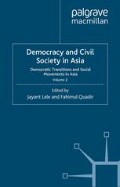Abstract
The Philippines has the most persistently undemocratic democracy in Asia. Except for the period of dictatorship under Ferdinand Marcos between 1972 and 1986, the Philippines has had a functioning democracy since independence from the United States in 1946.1 At the same time, a small group of powerful families has dominated politics and kept the economic benefits of power to themselves. Many analysts use the modifier ‘elite’ when referring to Philippine democracy. Effective participation by citizens outside of elections is limited. Unlike Malaysia and Singapore (much more obviously unlike the military dictatorship in Burma) with their Internal Security Acts, the Philippine state does not impose too many formal limits to the self-organization of disadvantaged groups. But a combination of bureaucratic rules and informal means including violence continues to make organizing difficult; without effective popular pressure, government is generally not accountable.
Access this chapter
Tax calculation will be finalised at checkout
Purchases are for personal use only
Preview
Unable to display preview. Download preview PDF.
References
Bolongaita, E. (1995), The Breakdown of Philippine Democracy in 1972: A Comparative Institutional Analysis, PhD Dissertation, Indiana: University of Notre Dame.
David, R. (1994), ‘Redemocratisation in the Wake of the 1986 People Power Revolution: Errors and Dilemmas’, Kasarinlan 11(3–4): 20.
Doronila, A. (1992), The State, Economic Transformation and Political Change in the Philippines, 1946–1972, Singapore: Oxford University Press.
Fukuyama, F. (1989), ‘The End of History’, The National Interest 16, Summer: 3–18.
Kimura, M. (1990), ‘Philippine Peasant and Labor Organizations in Electoral Politics: Players of Transitional Politics’, Pilipinas: A Journal of Philippine Politics Spring: 29–78.
Lande, C. (1969), ‘Brief History of Political Parties’, in Jose Abueva and Raul De Guzman, Foundations and Dynamics of Filipino Government and Politics Manila: Bookmark: 151–57.
Leones, E.B. and M. Moraleda (1996), ‘Philippines’, in W. Sachsenroder and U.E. Frings, eds., Political Party Systems and Democratic Development in East and Southeast Asia, Vol. 1, Brookfield, Vermont: Ashgate: 289–342.
Machado, K.G. (1974), ‘From Traditional Faction to Machine: Changing Patterns of Political Leadership and Organization in the Rural Philippines’, Journal ofAsian Studies, 33(4).
McCoy, A. (1995), Ana Anarchy of Families: State and Family in the Philippines, Quezon City: Ateno University Press.
—(1991), ‘The Restoration of Planter Power in La Carlota City’, in B.J. Kerkvliet and R. Mohares, eds., From Marcos to Aquino: Local Perspectives on Political Transition in the Philippines, Quezon City: Ateno De manila University Press: 105–42.
Mastura, M.C. (1995), ‘The Party List System Act of 1994’, in L. Dejillas, ed., Role of Political Parties in Government and Society, Manila: Institute for Development Research and Studies & Konrad Adenauer Foundation.
Miranda, F.B. et al. (1994), The Post-Aquino Philippines: In Search of Political Stability, Diliman, Q.C.: Social Weather Stations.
Rocamora, J. (1997), The Constitutional Amendment Debate — Reforming Political Institutions, Reshaping Political Culture, Manila: Ateneo Center for Social Policy and Public Affairs.
Shantz, A.A. (1972), Political Parties: The Changing Foundations of Philippine Democracy, PhD Dissertation, Ann Arbor: The University of Michigan.
Sidel, J. (1995), Coercion, Capital, and the Post-Colonial State: Bossism in the Postwar Philippines, PhD Dissertation, Ithaca, NY: Cornell University.
Tancangco, L. (1988), ‘The Electoral System and Political Parties in the Philippines’, in R. De Guzman and M. Reforma, eds., Government and Politics in the Philippines, Singapore: Oxford University Press: 77–112.
Wurfel, David (1998), ‘The Party-List Election: Sectoral Failure or National Success’? Political Brief, 6(2): 1–5.
Editor information
Editors and Affiliations
Copyright information
© 2004 Palgrave Macmillan, a division of Macmillan Publishers Limited
About this chapter
Cite this chapter
Rocamora, J. (2004). Formal Democracy and Its Alternatives in the Philippines: Parties, Elections and Social Movements. In: Lele, J., Quadir, F. (eds) Democracy and Civil Society in Asia: Volume 2. International Political Economy Series. Palgrave Macmillan, London. https://doi.org/10.1057/9780230285910_10
Download citation
DOI: https://doi.org/10.1057/9780230285910_10
Publisher Name: Palgrave Macmillan, London
Print ISBN: 978-1-349-51425-0
Online ISBN: 978-0-230-28591-0
eBook Packages: Palgrave Political & Intern. Studies CollectionPolitical Science and International Studies (R0)

